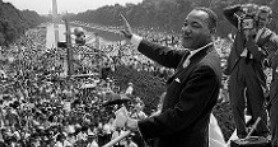“As the nation prepares to commemorate the 50th anniversary of the assassination of the Rev. Dr. Martin Luther King Jr., we should dwell not merely on how Dr. King died but also on how he lived. How he lived is why he died.” Jesse Jackson (read full article
here)King understood the inter-relationship of the sources of oppression and the need forfundamental, systemic and cultural transformation if humankind is to survive in freedom. Inperhaps the most ringing phrases of this speech, he taught that “if we are to get on to the rightside of the world revolution, we as a nation must undergo a radical revolution of values…the shiftfrom a thing-oriented society to a person-oriented society. When machines and computers,profitmotives and property rights, are considered more important than people, the giant triplets of racism, extreme materialism, and militarism are incapable of f being conquered.”Anticipating his final campaign – the Poor People’s Campaign, a year later –
and daring to include a critique of capitalism, King declared that “A true revolution of values will soon look uneasily on the glaring contrast of poverty and wealth.“
His commitment to nonviolence was deep and uncompromising. As King taught, reclaiming and healing the world and achieving a revolution of values necessitates bold, imaginative and nonviolent actions. To end and prevent wars. To honor and support the immigrants and refugees in our midst. To end racial and religious discrimination, to ensure economic and social justice. To defend and promote democracy. And to ensure human
survival by abolishing nuclear weapons and restoring environmental sustainability.
“If not us, who? If not now, when?”
(Read the IPB statement on the Speech “Beyond Vietnam”
here)

